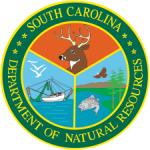Mission Statement:
A collaborative enterprise of the College of Charleston and the South Carolina Department of Natural Resources Marine Resources Division (SCDNR MRD), with former collaboration from NOAA NCCOS CCEHBR/Hollings Marine Laboratory and NIST, the mission of the Marine Resources Library (MRL) is to support the curricular and research needs of the faculty and students in the College of Charleston’s graduate and undergraduate programs in marine biology, and the work of professional researchers of SCDNR MRD.
Vision:
The MRL is the physical and virtual hub for the acquisition and sharing of information and the development of research and information literacy skills for its partner at the South Carolina Marine Resources Center.
Values:
- Committed to identifying and meeting the research needs of students and professional researchers
- Relevant in form and function for today’s students and professional researchers
- Timely in provision of resources and services
We strive to:
- Provide access to a relevant suite of quality print and electronic marine science research materials at the research and professional levels of scholarship.
- Train students, faculty, and researchers to competently discover, access, and ethically use the scholarship that supports their research objectives.
- Support research activity with a suite of synchronous and asynchronous library services including:
- Reference and research assistance
- Library instruction and subject guides
- Timely provision of library materials from other libraries
- Timely sharing of library materials to other libraries
- Offer a comfortable and functional study space with technology to promote and facilitate collaboration and information sharing.
- Engage stakeholders including by participating in events and field work and seeking new forms of collaboration.
An Innovative Partnership


History of the Library
The Marine Resources Library began in 1972 serving the research staff of the newly established Marine Resources Division of the South Carolina Wildlife and Marine Resources Department (now the South Carolina Department of Natural Resources) located at the Marine Resources Center at Fort Johnson on James Island, South Carolina. In 1977, the Marine Resources Division merged its library holdings with those of the College of Charleston’s Grice Marine Biological Laboratory which was also located at Fort Johnson. In August 1996, the library holdings of NOAA Fisheries/Charleston Laboratory (subsequently NOAA NOS CCEHBR Charleston Laboratory), located at Fort Johnson, were merged into the Marine Resources Library. In January 2007 the Library completed a renovation that included new carpet, new paint, and the installation of high-density shelving. This project increased shelf space by 35% and provided much-needed space for study. The overall project also contributed to the habitat for reef fish because some of the old shelving was given to the SCDNR/MRD Artificial Reef Program for the Shelf Reef Project.
The library’s collection strengths include marine biology, marine ecology, fisheries science, ichthyology, invertebrate zoology, toxicology, marine forensics, biotechnology, ecotoxicology, phycology, and biochemistry.